Stitches after birth: 10 ways to ease the soreness, according to a midwife
We speak to the experts for fail-safe tips
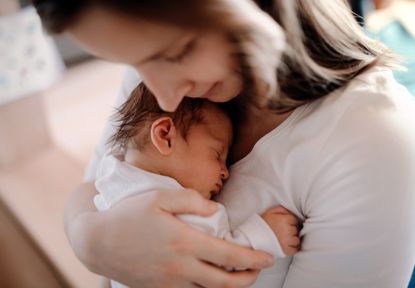

If you've had a vaginal birth, you'll know that the stitches you might need after birth can be uncomfortable and sometimes painful.
Some women even say that the soreness from their stitches after birth - especially in the first 24 hours after birth - is on a par with the pain of labour.
Even if you've had a particularly tough delivery, fear not. There are several ways to soothe the soreness and help you manage the pain until your stitches heal.
There are also preparations you can make during your pregnancy that could help reduce the likelihood and severity of trauma from giving birth, such as practising perineal massage from 34 weeks in pregnancy or applying warm compresses for an easier labour.
However, if you do sustain a tear or an episiotomy and require stitches after childbirth, knowing how to look after your body will help you with the healing and recovery process. Whether you have experienced a tear or not, soreness around the perineal area after vaginal birth is extremely common and giving yourself time to recover properly is key to ensuring a smooth transition into motherhood.
Here, Lesley Gilchrist, registered midwife and co-founder of My Expert Midwife, shares her top tips on how to best to look after the perineum after the birth of your baby to ensure optimal recovery.
How to soothe stitches after birth
Keep the area clean
First and foremost, Lesley recommends keeping the area where you’ve had stitches very clean by bathing or showering at least twice a day, as this will minimise the risk of infection. It's best to use plain warm water or specialist Epsom Salts. My Expert Midwife bath Soak for Bits contains premium Epsom Salts as well as tee tree, bergamot and calendula essential oils to provide instant pain relief, and arnica to soothe muscle aches and reduce swelling or postnatal perineal discomfort. After your bath, carefully pat your stitches dry and avoid rubbing with a towel. Your midwife or GP will be able to advise further on this.
GoodtoKnow Newsletter
Parenting advice, hot topics, best buys and family finance tips delivered straight to your inbox.

Use soothing products
An icepack wrapped in a cloth, or clean muslin can be used to tackle perineal discomfort by gently pressing it on the painful area. Be sure not to apply too much pressure though, and always be gentle with yourself.
Another option is to apply soothing (natural) products to the area. For instance, My Expert Midwife’s Spritz for Bits provides instant relief for perineal soreness, bruising and swelling after childbirth, and is safe to use immediately after birth.
Change sanitary pads regularly
Change your sanitary pads at least every four hours as this reduces the likelihood of getting an infection in the area. You can buy maternity pads which are softer, longer and more absorbent. The good thing about maternity pads as well is that they're a lot less likely to irritate stitches, as they don't have the same plastic coating that regular sanitary pads do.
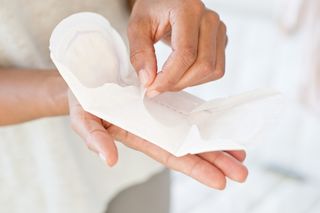
Start pelvic floor exercises as soon as you feel able
Pelvic floor exercises will strengthen your muscles and help you to feel in control of your bladder and bowel, both in the present and later in life. Start practicing your pelvic floor exercises as soon as you feel able - start gently and build up the intensity gradually.
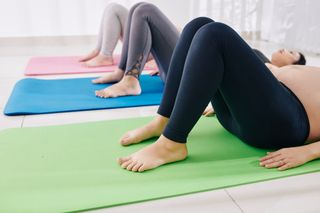
Keep an eye out for abnormalities
If you feel as though the pain is worsening as the days go by, or if you notice an unusual smell, swelling or oozing from the area, make sure you contact your midwife or GP for advice. If it is becoming infected, you may require a course of some antibiotics.
Wash your hands
It seems obvious, but make sure to wash your hands before and after going to the toilet to limit the spread of bacteria. It's important to maintain a good level of hygiene when recovering, to prevent risk of infections or irritations.
Take regular pain relief
Whether or not you have had stitches, childbirth is a demanding experience, and you will feel the effects of it in the following days. Remember to take regular pain relief that you’ve been prescribed or bought over the counter- this will help to relieve any soreness and keep you more comfortable.
Eat healthily and drink water
A diet high in soluble fibre and vitamins (with plenty of fresh fruit and vegetables) will help your body to heal from any wounds, such as an episiotomy or a tear. Fruit smoothies are a great option. Drinking plenty of water will also aid the healing process and help to make bowel movements easier to pass.
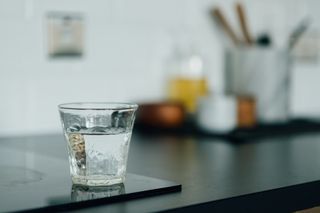
Take time to rest
While not always easy, as a new mum, taking time out to rest and recover is vital for the healing process. Try to sit or lie in positions that feel most comfortable for you. You may need to change these regularly to ensure maximum comfort.
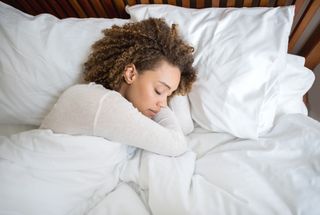
If you have any concerns and stitches after birth contact your midwife or GP
Most importantly, if you have any concerns about the progress of your recovery, contact your midwife or GP for a check up and advice. They are always on hand to make your transition into motherhood as easy as possible.
Video of the week:

Lucy Buglass is a Digital Writer for What's on TV, Goodto.com, and Woman&Home. After finishing her degree in Film Studies at Oxford Brookes University she moved to London to begin her career. She's passionate about entertainment and spends most of her free time watching Netflix series, BBC dramas, or going to the cinema to catch the latest film releases.
-
 I tested the Lakeland Dual Basket air fryer and it made midweek family cooking a breeze
I tested the Lakeland Dual Basket air fryer and it made midweek family cooking a breezeYou can’t go wrong with the dual basket air fryer by Lakeland complete with easy-view windows to ensure burnt food is a thing of the past…
By Jessica Dady Published
-
 Reframing one simple habit could get your sex life back on track after having a baby, new research shows
Reframing one simple habit could get your sex life back on track after having a baby, new research showsMany parents struggle to get their sex life back on track after having a baby, but new research has shown how one simple habit could make all the difference.
By Ellie Hutchings Published